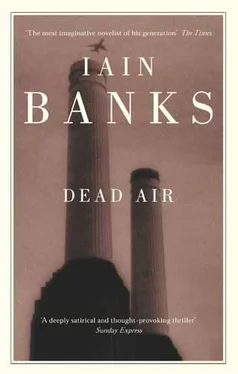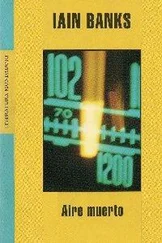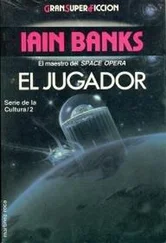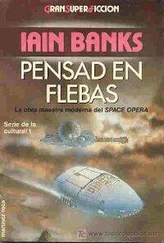‘Yeah yeah yeah, but just turn and look behind you. Look.’
Jo turned round and looked at the shop window she’d had her back to while we’d being going through all this stuff. We’d included Bond Street in our Sunday after-lunch stroll because I’d wanted to look in some posh jewellers and see if they had my excessive new watch. The shop we’d happened to stop outside was a jewellers. And its window was full of fish slices, suspended in the space behind the glass like a surreal hail of twinkling trowels. It was The Rabinovich Collection of Antique and Modern Silver Fish Slices, to quote the elegant sign in the window (we were a few doors down from a shop called Zilli, which seemed somehow appropriate). ‘How the fuck,’ I asked, ‘can you not love a city that throws up stuff like that?’
Jo was shaking her head. She was blond again, and had taken to teasing her short hair into little meringue-like spikes. She stuck her arm through mine. She was wearing a silver puffa jacket. I wore an old RAF greatcoat an uncle had given me when I was seventeen. ‘Come on,’ she said. ‘I’m getting cold.’ We started walking again, heading south, back towards the river.
‘And music, of course,’ I said. ‘I love music.’
‘But you just said you hated the stuff you have to play.’
‘Yeah, because it’s commercial effluent. It’s the sonic equivalent of a Coke or a McDonald’s; it fills you up but it’s just production-line shit and there’s precious little in there that’s really any good for you. The music I love is the music people make because they have to, because they need to, from their souls, not their wallets.’
‘You don’t believe in souls.’
‘I don’t believe in immortal souls. I just mean the kernel of who you are, not anything superstitious.’
‘Yeah, well, be thankful you just have to play the stuff and don’t need to get involved in the process of making it.’
‘You make it sound like pies.’
‘Pies?’
‘Yeah. You know; that thing about it being a good idea – if you like eating pies – never, ever to see how they were made and what goes into them.’
‘Yeah, well,’ Jo said, hoisting one steel-studded eyebrow, ‘believe me; there are a lot of pie bands out there.’
‘I believe the same applies to sausages.’
‘Ditto.’
I looked over to the far side of the street, at the DKNY shop. I remembered Ceel telling me about its five thousand red twin-towers T-shirts, nearly three months ago. In the December cold I shivered for the dark, baking heat of that hotel room. That had been another, solitary feature of today’s walk, one I couldn’t share with Jo. Our route had taken us past a few of the hotels I’d been in with Ceel. We had passed Claridge’s just ten minutes earlier, and I’d almost suggested that we went in for a drink, or a pot of tea, or just the chance to pretend we were guests and get to ride in a lift that actually had a uniformed lift-operator, but in the end some prophylactic instinct, some grudgingly acknowledged requirement to obey Celia’s stricture about keeping our affair as separate as possible from the rest of our lives, prevented me.
‘Is that your watch?’ Jo said, stopping at another jewellers’ window and nodding at a display of chunkily sparkling Breitlings on a background of piled yellow cloth.
I glanced at the arm-lengthening bracelet of heavy metalwork on my left wrist. ‘No,’ I said. ‘Not nearly expensive or complicated enough.’
Jo looked at my new watch and shook her head as we walked on. ‘That thing makes you look ten years older, you know.’
‘Don’t diss my timepiece, ho.’
‘It makes you look like you should be driving a Roller and shopping for – fucking hell; those.’
We both stared at and then walked quickly past a window containing two large thrones – mere chairs they were not – made of cut crystal and red velour.
‘Holy shit.’
‘Did we really see those?’
‘I feel ill.’
We walked to the Embankment via St James’s Park, through similarly sauntering locals and clumps of tourists, amongst coots, storks, black swans and panhandling squirrels. Ahead, the top of the London Eye stood out against sky, revolving almost imperceptibly over the departmental buildings of Whitehall like an ironic, skeletal halo.
‘Hey! Skating. Cool.’
‘Almost by definition,’ I muttered. ‘Look, can we head back after this? My feet are sore.’
‘Yeah, okay.’
Jo guided me into the great courtyard of Somerset House, where a temporary ice rink had been set up for the winter holidays. Strings of lights articulated the wide quad. Tall windows, columns, arches and chimneys looked down upon the scene, where hundreds of people ambled about, sat swaddled in thick clothes outside little cafés, or stood watching the skaters, who circulated above the inscribed white ice like a slow, flat sweep of leaves caught in a stirring wind. I could smell coffee, fried onions and mulled wine.
Above us was a water-colour sky, hues bleeding and feeding and fading into each other as the light started to wane above the skeins of slowly drifting cloud.
On the ice, people laughed and shrieked, holding on to each other or the sides of the rink, doubled over, feet skidding. Squeals echoed off the courtyard’s imposing architecture as people fell thumping to the cold, scarred surface of the rink. A gap opened in the crowds on the ice, there was a blur of rising blue as somebody jumped, and that was when I saw it was Celia.
She was dressed in a powder-blue skating outfit: tights, a short, flared skirt and a sort of tight tunic with a high neck and long sleeves. She wore brown gloves and white skates. Her hair was gathered up. Rising to the top of the jump that had first caught my attention, she twisted sleekly in the air, spinning once, then landed square on her right blade, knee bent, her left leg held out straight behind her. The quiet smack of her blade landing sounded across the ice between the circulating bodies; she sliced away, arms out to balance herself, sizzing across the ice in a wide, slowly tightening spiral. She skilfully avoided a couple of other skaters and then, with an elegant little skip, turned to skate backwards into a clearing space near the centre of the rink, stooping and tensing her body for another jump.
People got in the way, and I lost sight of her. I moved to the metal fencing describing the edges of the rink, putting my hands on the cold tube of rail, trying to see her again. Lengths of blue plasticised canvas were tied to the fencing and I could feel one of the plastic ties under my left hand. My mouth felt cold and dry and a swirl of wind made me feel the tears in the corners of my eyes. I saw her once more as the crowds on the ice parted again and her skimming, sinuous course brought her gliding on a metal hiss towards me like a fabulously exotic alien creature fallen into our mundane world from a higher reality.
I suddenly realised two things. The first was that I had never really seen this woman in daylight before. The second was that she was the most beautiful thing I had ever beheld.
She swivelled, poised, jumped and landed, and then swung into a neat spin, perfectly centred, not ten metres away. She brought her arms in and raised them above her head. The spin speeded up and her slim body became a tall blurred pillar of light blue above a spray of white, reflected light strobing off the glittering blades of her boots. She came out of it and pushed away again, edges aslant across the rasping surface. A smattering of applause from people on and off the ice followed her, and she smiled but didn’t otherwise acknowledge the acclaim or look anybody in the eye. She passed only a couple of metres away from me and I swivelled to watch her. Her expression was diffident, almost embarrassed. A blush of rose glowed beneath the light-brown skin of her face.
Читать дальше












